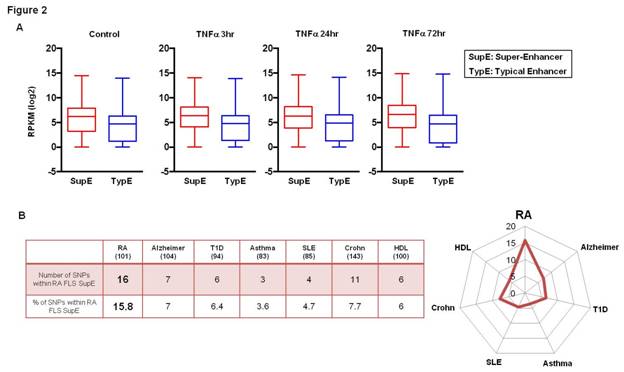Session Information
Date: Monday, November 9, 2015
Title: Cytokines, Mediators, Cell-cell Adhesion, Cell Trafficking and Angiogenesis Poster II
Session Type: ACR Poster Session B
Session Time: 9:00AM-11:00AM
Background/Purpose: Enhancers are regulatory elements that modulate transcriptional rates of genes. Super-enhancers (SupE) are extremely large enhancers associated primarily with highly expressed genes that have critical functions in health and disease. The purpose of this study was to map typical enhancers and super-enhancers (SupE) in rheumatoid arthritis (RA) synovial fibroblasts (FLS).
Methods: Chromatin immunoprecipitation sequencing (ChIPseq) was used to evaluate H3K27 acetylation (Ac) genome-wide in control and TNF-stimulated FLS. Typical enhancers and SupE, were identified by H3K27Ac signal, using HOMER in a similar manner to the method described in Whyte et al. Cell 2013;153(2):307-19.
Results: The number and distribution of typical enhancers and SupE in FLS is modulated by TNF-stimulation in a time-dependent manner (Figure 1A-B). In some loci TNF-stimulation induces SupE (Figure 1C-D) and in others, baseline SupE are down-regulated or abrogated (Figure 1E). SupE-associated genes display significantly higher expression levels, compared to typical-enhancer-associated genes, in control and TNF-stimulated cells (Figure 2A). 16 RA-associated Single Nucleotide Polymorphisms (SNPs) are localized within SupE in RA FLS (Figure 2B).
Conclusion: The enhanceosome and super-enhanceosome is highly dynamic in RA FLS. TNFa has a genome-wide impact on FLS chromatin, suggesting that during the course of synovitis inflammatory mediators induce a pathogenic behavior by altering the landscape of enhancers and SupE in FLS. RA-associated SNPs are enriched in SupE of RA FLS, supporting the critical role of FLS in RA pathogenesis.
To cite this abstract in AMA style:
Park SH, Sohn C, Loupasakis K, Lee A, Giannopoulou E, Ivashkiv LB, Kalliolias GD. Dynamic Regulation of Enhancers and Super-Enhancers in Rheumatoid Arthritis Synovial Finroblasts [abstract]. Arthritis Rheumatol. 2015; 67 (suppl 10). https://acrabstracts.org/abstract/dynamic-regulation-of-enhancers-and-super-enhancers-in-rheumatoid-arthritis-synovial-finroblasts/. Accessed .« Back to 2015 ACR/ARHP Annual Meeting
ACR Meeting Abstracts - https://acrabstracts.org/abstract/dynamic-regulation-of-enhancers-and-super-enhancers-in-rheumatoid-arthritis-synovial-finroblasts/


